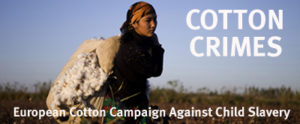14 November 2014

17 people lost their lives and millions, including children, were forced to pick cotton in the 2014 Uzbek cotton harvest in one of the largest state-sponsored systems of forced labour in the world, said the Cotton Campaign in its annual Uzbekistan cotton harvest review.
According to the report the government of Uzbekistan once again used systematic, mass forced labour to harvest cotton in 2014. In addition to coercing as many as four million people across the country to pick cotton, this forced labour system resulted in institutionalized harassment, extortion, and needless deaths.
Millions of Uzbek citizens were required to work in the cotton fields by local officials upon instructions from the very top of Uzbekistan’s hyper-centralised government. Continuing a trend started in 2012, the government reduced the number of children forced to pick cotton by increasing the forced labour burden on adults. The government did not, however, eliminate child labour.
Among the most tragic findings of the report was that some people have paid the ultimate price as a direct result of the government’s practices. In one case, a 3-year-old and a 5-year-old died in a house fire after being left alone while their mother, who could not afford to buy herself out of the harvest, went to pick cotton.
The report documents the forced mobilisation of 13-15 year old children in the Kashkadarya, Jizzakh, and Samarkand regions, especially toward the end the harvest. Despite decrees from the central government reminding local officials of the national law prohibiting child labour, when faced with the decision of whether to fulfil their central government-imposed cotton quotas or follow the law against child labour, officials sent children to the fields, knowing failure to deliver their quota would risk their jobs.
People who could not or did not want to harvest cotton had to pay for replacement workers and the government extorted mandatory payments from business to support the harvest. Parents in some schools and kindergartens were explicitly forced to pick cotton in place of their children. The government imposed harvest quotas on public institutions such as schools, hospitals, and local administrations, and required them to send up to send 30-60% of staff to the fields, a major increase over last year, seriously undermining the provision of key public services, such as health care and education.
The report is the result of evidence gathered by the network of monitors in Uzbekistan deployed by the Uzbek-German Forum for Human Rights, a Cotton Campaign member.
“Cotton in Uzbekistan is produced by massive human rights violations, including forced labour, said Umida Niyazova, director of the Uzbek-German Forum. “Reducing the number of children in the fields by forcing even more adults to work against their will is not sufficient. The government needs to dismantle the forced labour system.”
Uzbekistan is the fifth largest cotton producer in the world, producing raw cotton mainly for export. The government controls every aspect of production and imposes mandatory production quotas on farmers and harvesting quotas on pickers. All cotton must be sold to the government at government-established prices..
“Teachers, doctors and nurses are needed in their communities more than in cotton fields,” said The American Federation of Labour and Congress of Industrial Organizations (AFT or AFL-CIO).
“They have obligations to their students and patients as trusted professionals, and the state has an obligation to allow them to do their jobs, rather than forcing them into fields to harvest cotton. We are also very concerned about the costs these workers face to fund their participation in the cotton harvest, as well as consistent reports of deplorable working conditions and accommodations.”
With technical assistance from the International Labour Organization (ILO), the government of Uzbekistan conducted its own monitoring of efforts to eliminate the use of children under age 18 in the harvest, and the ILO praised the government’s monitoring. A number of the conclusions of that monitoring, however, were clearly contradicted by documentary evidence and eyewitness accounts collected by the Uzbek German Forum’s monitors. Again this year the authorities harassed and detained independent civil society activists and media attempting to report on the harvest.
“It’s clear from this report that Uzbekistan continues to have a serious problem with forced labor, said Nate Herman, from American Apparel and Footwear Association (AAFA).
“For this reason, many of our members have pledged not to purchase or use Uzbek cotton. We would encourage any company linked with Uzbekistan to follow that lead and look carefully into their supply chains.”
The Cotton Coalition calls on the United States government and European Union to urge the government of Uzbekistan to end its forced labour system, starting by granting the ILO unfettered access to survey forced labour and initiating agriculture sector reforms.
With the UK Government’s continues policy to promote the trade with Uzbekistan, including the latest meeting of the Uzbek-British Trade and Industry Council held in Tashkent on 7 November, the continues use of forced labour in Uzbekistan’s cotton industry puts into question the seriousness of UK government’s commitment to be a world leader in eradicating slavery.
Klara Skrivankova, Europe Programme and Advocacy Coordinator at Anti-Slavery International, said:
‘Once again the Uzbek Government forced its own citizens to pick cotton that only a narrow political elite benefits from. Let’s make it clear: it is slavery, and it is not acceptable by any standards.’
‘European governments should do more to stop these abuses. The British Government waves the flag of an anti-slavery leader, yet it continues to promote trading opportunities for British businesses in Uzbekistan. Maybe it would be taken more seriously if it stood up against a system that is based on forced labour.
‘A lot of Uzbek cotton, via China and Bangladesh, ends up on the shelves of European retailers, so businesses should also do much more to ensure that Uzbek cotton doesn’t get into their supply chains.